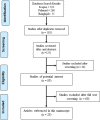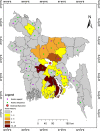Twenty-two years of dengue outbreaks in Bangladesh: epidemiology, clinical spectrum, serotypes, and future disease risks
- PMID: 37434247
- PMCID: PMC10334535
- DOI: 10.1186/s41182-023-00528-6
Twenty-two years of dengue outbreaks in Bangladesh: epidemiology, clinical spectrum, serotypes, and future disease risks
Abstract
Dengue is the most rapidly spreading mosquito-borne disease and has become a major public health threat, particularly for tropical and subtropical countries including Bangladesh. This comprehensive review aims to summarize the overall scenario of dengue, including disease burden, clinical spectrum, seroprevalence, circulating serotypes/genotypes, and spatial distribution since the first recorded outbreak in Bangladesh. Since the first recorded outbreak in 2000, dengue epidemiology has shown the typical epidemic pattern with more frequent and bigger outbreaks and gradual geographic expansion to non-endemic regions in Bangladesh. For instance, highly confined Rohingya refugee camps that provide shelters to nearly 1.2 million forcibly displaced vulnerable Myanmar nationals in Cox's Bazar district confronted a massive outbreak in 2022. Recent major outbreaks are found to be associated with the emergence of serotype DENV-3, which was undetected for a long time. Consequently, changes in serotypes might be attributed to increased severity in clinical manifestation in recent years. The existing weak surveillance and risk management systems are inadequate to deal with impending dengue risks. The healthcare system, particularly at the district level, is not prepared to manage impending large-scale dengue outbreaks in Bangladesh. Our findings would contribute to the development of strategies for dengue control and management in Bangladesh as well as other similar settings elsewhere in the world.
© 2023. The Author(s).
Conflict of interest statement
We declare that there is no conflict of interest.
Figures




References
-
- Dengue and severe dengue. [cited 13 Oct 2022]. Available: https://www.who.int/news-room/fact-sheets/detail/dengue-and-severe-dengue.
-
- Ten threats to global health in 2019. [cited 13 Oct 2022]. Available: https://www.who.int/news-room/spotlight/ten-threats-to-global-health-in-....
-
- Dengue vaccine safety update. [cited 14 Jun 2023]. Available: https://www.who.int/groups/global-advisory-committee-on-vaccine-safety/t....
-
- Colón-González FJ, Sewe MO, Tompkins AM, Sjödin H, Casallas A, Rocklöv J, et al. Projecting the risk of mosquito-borne diseases in a warmer and more populated world: a multi-model, multi-scenario intercomparison modelling study. Lancet Planet Heal. 2021;5:e404. doi: 10.1016/S2542-5196(21)00132-7. - DOI - PMC - PubMed
Publication types
LinkOut - more resources
Full Text Sources
